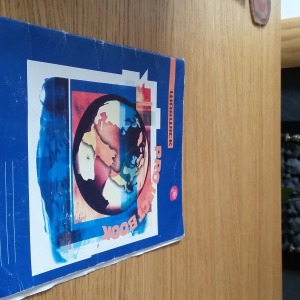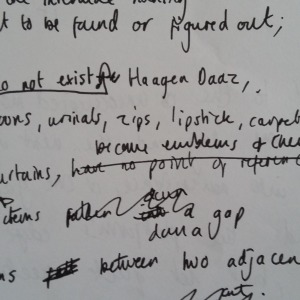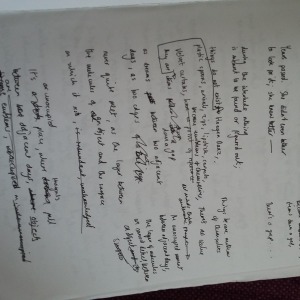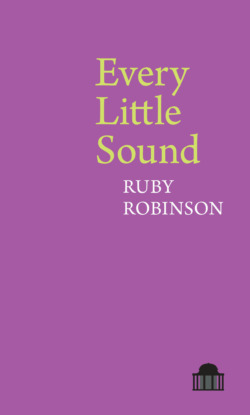This poem was the first poem I tried to write after a period of about three years during which I didn’t write at all. During this time, I was making some significant discoveries about my family, my mother and myself, unpicking the deep legacies of intergenerational trauma. One day, after work, I took myself to the library and forced myself to write something. The poem became emblematic of the process of discovery of a voice, both in my writing and in my personal life. It feels to me like a sort of bridge or passage from one period of my writing life to another.
I started writing poetry regularly in 2007 but the work I produced for the first couple of years was unsatisfying and, I felt, devoid of genuine emotion. I’d felt a strong opposition to the idea of what Wordsworth (in the Preface to Lyrical Ballads, 1798) called the ‘spontaneous overflow of powerful feelings’ and as such I was writing mainly fictitious or superficial observations. In fact, I was mainly writing rather bland short stories. Then in 2009 I read the essay ‘The Neural Lyre’ by poet Frederick Turner and scientist Ernst Pöppel, first published in Poetry magazine in 1983. This collaborative essay explains how the brain’s creative capacities are enabled by the integration of the scientific left and the emotional right brain hemispheres. The authors discuss metered poetry as a technique to enhance the integrative powers of the brain. This essay helped me to understand that the personal and the emotional are crucial and the key is channeling these elements whilst retaining sort of universal, rational objectivity.
I also remembered listening to the poet Elizabeth Barrett speaking about Graham Greene’s term ‘splinter of ice’ in a talk on ‘the art of the personal’. She had discussed the way that form could function as a regulator of emotion, much in line with ‘The Neural Lyre’. Greene, describing his observation of a mother screaming for her dead child, famously referred to the “splinter of ice in the heart of a writer.” He said, “I watched and listened. This was something which one day I might need.” I guess in the intervening years I mulled this idea over as I also got to grips with the difficulties I faced in expressing the complexities of my personal experience.
As a result of my own experiences as well as others’ I had observed, I felt a strong pull to try and articulate something of the tension between silence and voice, speaker and listener, oppressor and oppressed. ‘Interlude’ was a first, tentative step towards this. I had been thinking about how humans construct mythical, make-belief structures in real life, just as on the stage. The same mechanism that suspends our disbelief when watching a play also anaesthetises our minds from harsh realities within families and communities, allowing the pervasive human tendency to collude in silence.
Around the time I was trying to write ‘Interlude’, I had come to realise that ‘writer’s block’ feels similar to the silencing effect caused by oppression by powerful others. (See Cunningham, M. T., ‘Writers’ Block: A Failure of the Neurological Network’, 20th IMP Conference, 2004 at for an interesting discussion about writers’ block, trauma and neurology). I also learnt that physically and emotionally breaking away from those who oppress can unlock the ability to express oneself. At the same time, the understanding, articulation and voicing of experience further enables the breaking away.
Writing ‘Interlude’ was a case of wrestling with this silencing force at the same time that I was making significant changes in the relationships in my life. The poem didn’t come easily and is still not satisfactory to me – but it feels special because of this struggle and imperfection.
The numerous drafts of ‘Interlude’ show how it was necessary to control the roughness of the earlier drafts. I reworked the poem into six tercets, which helped to moderate any surplus words and emotion, and measure the units of sense in each line. I also tried to create a more objective or detached voice and tone, in order to allow the imagery to stand out. I wanted to attempt to give a voice to those silenced by more powerful others, to articulate the mechanism that allows this and so felt the voice would have to be intelligent, calmly and rationally speaking the truth so as to withstand accusations of sentimentality. You can see from the many drafts of the poem how difficult this process was! ‘Interlude’ set the thematic stage for the subject matter and tenor of the poems I went on to write, some of which are included in my collection Every Little Sound.
Draft 1
Interlude
Years passed. She didn’t even bother
to look for it; she knew better –
during the interlude
nothing is meant to be found or figured
out. There’s Häagen-Dazs, there’s tiny plastic spoons,
urinals, zips, lipstick, carpets,
velvet curtains, figures in black t-shirts
carrying furniture,
lingering in that dark place where eyelids meet
just long enough so you notice your eyeballs
warm through, repositioning the world
apt for human beings to drop from the sky
fully dressed, fleshed out, lit up from within
pinned in place by tubes of searchlight,
carrying on as though nothing happened
and it feels like even if the actors had all just died on stage
(from food poisoning, say) and army men, politicians, vicars, presidents, the actors’ mothers,
sisters, brothers, the actors’ fathers
had burst in, sprinted between the blocks of seats
to get to the stage
to rape the corpses, and beat them, set wild dogs on them –
judges and juries would look on through gleaming faces,
the entire world would.
And we’d sit for fifteen minutes, breathing out and then in
taking nothing in, breathing out not even thinking, years could pass until,
startled by the score from the pit, the light peeled back,
the timbre of a triangle being struck
we would remember these figures, who look a bit like us,
unfurl from the stage and play on.
Draft 4
Interlude
Years passed. She didn’t even bother
to look for it; she knew better –
During the interlude
nothing is found or figured out.
Minds unhitch from themselves; orbit-less.
Häagen-Dazs, plastic spoons, urinals,
zips, lipstick, carpets, velvet curtains
down the gap
between the platform and the train.
Eyelid meets eyelid,
your eyeball warms.
Though no atoms of any one object
can ever touch the atoms of another,
figures in black t-shirts
lift furniture, stack chairs,
reposition the world
for human beings to drop from the sky
fully dressed, fleshed out, lit up,
pinned in place by tubes of searchlight,
carrying on as though nothing
happened, and it feels like –
had the actors died on stage (from food poisoning, say)
and army men, politicians, vicars,
presidents, the actors’ mothers, sisters, brothers,
the actors’ fathers
burst in, sprinted past the blocks of seats
onto the stage and raped the corpses, beat them,
set wild dogs on them –
judges and juries would look on through gleaming faces,
the entire world would.
And we’d sit for fifteen minutes, breathing out and then in
taking nothing in, breathing out not even thinking, years could pass
until, startled by the score from the pit, the light peeled back,
a triangle struck, we would remember
these figures, who look just like us, unfurl from the stage
and play on.
Draft 6
Interlude
During the interlude, nothing is found or figured out –
minds unhitch themselves, orbit-less. Eyes forget to blink.
Plastic spoons, Häagen-Dazs, lipstick, urinals, velvet curtains,
left and right brain hemispheres float
in the gap between one universe and another, between a platform
and a train. A streetlight falters, an oak tree sheds its entire season in one breath,
figures in black t-shirts reposition the world,
until humans descend, fully dressed, fleshed out –
pinned in place by tubes of searchlight
and it feels like – were the actors to drop to the stage, dead (from food poisoning, say)
and soldiers, politicians, vicars, presidents, the actors’ mothers,
sisters, brothers, the actors’ fathers to burst in, sprint past the blocks of seats
onto the stage, beat the corpses, rape them, set untrained dogs on them –
judges and juries would look on through gleaming faces –
the entire world would. We’d sit for fifteen minutes, breathing out and in, taking nothing in,
breathing out not even thinking, years could pass until,
startled by the score from the pit, the light peeled back, a triangle struck, we’d notice
these figures, who look just like us, unfurl from the stage and play on.
Final Poem
Interlude
During the interlude, nothing is found or figured out – minds unhitch
orbit-less. Eyes forget to blink. Plastic spoons, Häagen-Dazs, lipstick,
urinals, red curtains, left and right brain hemispheres are floating
in the gap between one universe and another, between a platform
and a train. A streetlight falters, an oak tree sheds its season in one breath,
black T-shirts reposition the world and clothed bodies descend,
pinned in place by tubes of searchlight. You can hear somebody
refolding their legs, the squeak of a shoe’s leather, a boiled sweet
rolling from one cheek to the other and it feels like – were the actors
to drop dead (from an after-party in the theatre bar last night,
that someone spiked) and soldiers, politicians, vicars, presidents,
the actors’ mothers, sisters, brothers, the actors’ fathers to burst in,
sprint past the blocks of seats, beat the corpses, rape them, set dogs
on them – judges and juries would look on through gleaming faces
as we look on now for fifteen minutes, breathing out, breathing in.
Years pass. Some shout their pain from a soundproof box
until, startled by the score from the pit, the light peeled back,
a triangle struck, we see ourselves rise from the stage and play on.
Ruby Robinson was born in Manchester in 1985 and lives in Sheffield. She studied English Literature at the University of East Anglia and has an MA from Sheffield Hallam University where she also won the Ictus Prize for poetry. Her poems have appeared in The Poetry Review, Poetry (Chicago) and elsewhere. Her debut collection, Every Little Sound (Liverpool University Press), is shortlisted for the Forward Prize for Best First Collection.





Add your Reply
You must be logged in to post a comment.